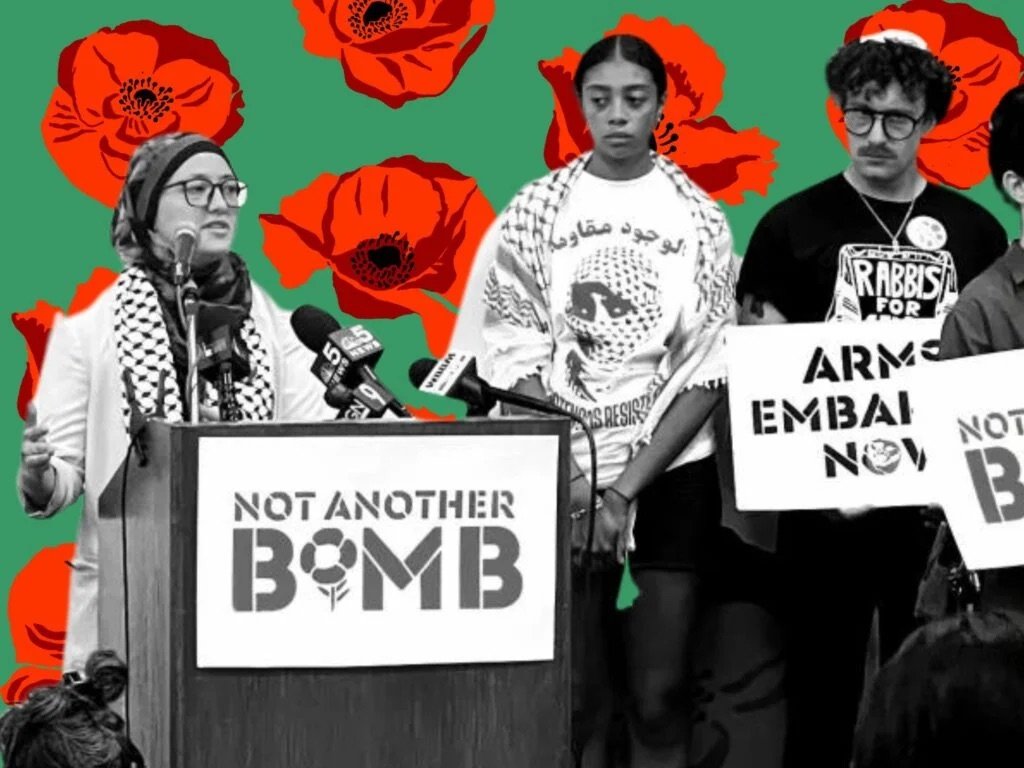Palestine: From Shifting the Discourse to Changing US Policy



The movement opposing Israel’s genocidal war in Gaza has transformed this country’s conversation about Palestine. This achievement, and the passion and political creativity displayed since October 2023, opens the path to forcing a change in US policy—and to putting internationalism at the center of the progressive movement’s agenda.
by Max Elbaum
Eighty percent of Democrats support a permanent ceasefire and somewhere around 63% support conditioning weapons aid to Israel. But the Biden administration is still sending the bombs that Israel uses to kill children.
The Lancet, one of the most prestigious peer-reviewed medical journals in the world, estimates that the death toll from Israel’s assault on Gaza as of June 2024 would approach 186,000, 7–9% of Gaza’s total population. The equivalent figure for the US would be 27 million people dead.
Though it is a tribute to all who have protested that the Democratic presidential nominee now uses (and may even in a way believe) the phrases “Palestinian dignity” and “Palestinian self-determination,” the Democratic Party leadership still will not allow a Palestinian-American to speak their own truth from the Democratic Convention podium. And the US Department of Justice is bringing terrorism charges against six Hamas leaders while letting Israeli Prime Minister Netanyahu slide, despite his pending arrest warrant from the International Criminal Court on war crimes charges.
Such are the reminders of how far we still need to go to end US complicity with the genocide taking place in Gaza. Every single day it continues is a human catastrophe.
Yet it should bolster rather than diminish our sense of urgency to realize that the movement for a ceasefire and Palestinian rights has accomplished a great deal over the last year. If we can combine that sense of urgency with effective strategy and persistent action, we can make even greater headway in the pivotal weeks and months ahead.
(For weekly updates on what is happening in Gaza, the Middle East, and international and US politics, as well as listings of actions to take, follow Arab Resource and Organizing Center analyst Samer Araabi’s reports on the weekly Palestine Solidarity Announcements program; recordings of all past calls are posted here.)
The pro-Israel narrative has been shattered
The US movement opposing Israel’s war on the people of Gaza marks a turning point. It is a watershed in solidarity with Palestine on what has been a third rail of US politics since World War II. It has made breakthroughs in accurately naming what is taking place in Gaza and in targeting Israeli settler colonialism and apartheid as the root cause of the violence that afflicts all those who live in historic Palestine and constantly threatens war throughout the Middle East.
As early as last December, evidence presented by South Africa to the International Criminal Court convinced the Court that it was “plausible” Israel was violating the Genocide Convention. Since then the scale of carnage has only grown and with each passing day more is revealed about the scale of death and destruction. When someone like former Israeli soldier and Professor of Holocaust and Genocide Studies Omer Bartov changes his mind and decides that in fact Israel is committing genocide in Gaza (and compares the actions and mentality of the Israel military to that of the German military in World War II) the case is open and shut for anyone not in active denial.
The combination of this carnage (seen in real time across the world’s cellphone screens) and the outpouring of pro-Palestine activism has transformed the country’s conversation about Israel, Palestine, and US policy. The main arguments that defenders of the Israeli ethnostate relied upon pre-2023 (already under strain by the consensus among global human rights groups that Israel is an apartheid state) have collapsed. The claims that Israel is a “light among nations,” “the only democracy in the Middle East,” deploys “the most moral army in the world,” is a peace-loving state in a supposed “bad neighborhood”—all these lie in tatters.
The movement for a ceasefire and an end to US military aid to Israel has captured the moral and intellectual high ground. It has transformed the thinking on Palestine among younger people, within the trade union movement, and within the voting base of the Democratic Party. It has effectively put an end to PEP—Progressive Except Palestine—as a viable stance among partisans of social justice. It has filtered upward to reshape the view of congressional staffers and mid-level administration officials.
A corner has been turned, there is no going back
This tectonic shift in US public opinion will only get broader and deeper as more information emerges about the scale of the Gaza genocide. And dissatisfaction with US backing for Israel will grow as Palestine solidarity efforts increasingly make clear how essential the arms shipments and political/diplomatic cover the US provides Israel are to all the killing.

